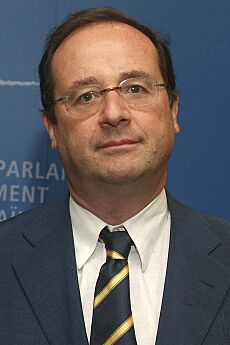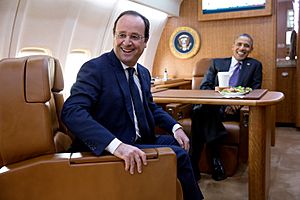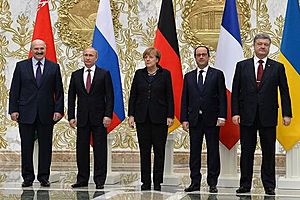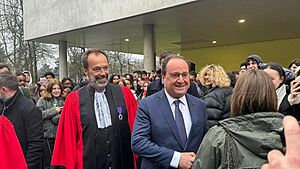François Hollande facts for kids
Quick facts for kids
François Hollande
|
|
|---|---|
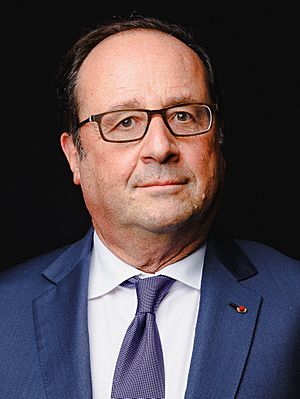
Hollande in 2017
|
|
| President of France | |
| In office 15 May 2012 – 14 May 2017 |
|
| Prime Minister | Jean-Marc Ayrault Manuel Valls Bernard Cazeneuve |
| Preceded by | Nicolas Sarkozy |
| Succeeded by | Emmanuel Macron |
| President of the General Council of Corrèze | |
| In office 20 March 2008 – 15 May 2012 |
|
| Preceded by | Jean-Pierre Dupont |
| Succeeded by | Gérard Bonnet |
| First Secretary of the Socialist Party | |
| In office 27 November 1997 – 27 November 2008 |
|
| Preceded by | Lionel Jospin |
| Succeeded by | Martine Aubry |
| Mayor of Tulle | |
| In office 17 March 2001 – 17 March 2008 |
|
| Preceded by | Raymond-Max Aubert |
| Succeeded by | Bernard Combes |
| Member of the National Assembly for Corrèze's 1st constituency |
|
| Assumed office 18 July 2024 |
|
| Preceded by | Francis Dubois |
| In office 12 June 1997 – 14 May 2012 |
|
| Preceded by | Lucien Renaudie |
| Succeeded by | Sophie Dessus |
| In office 23 June 1988 – 1 April 1993 |
|
| Preceded by | Constituency re-established |
| Succeeded by | Raymond-Max Aubert |
| Member of the European Parliament | |
| In office 20 July 1999 – 17 December 1999 |
|
| Constituency | France |
| Personal details | |
| Born |
François Gérard Georges Nicolas Hollande
12 August 1954 Rouen, France |
| Political party | Socialist Party |
| Spouse |
Julie Gayet
(m. 2022) |
| Domestic partners |
|
| Children | 4 |
| Alma mater | Panthéon-Assas University HEC Paris Sciences Po Paris École nationale d'administration |
| Signature | |
| Military service | |
| Branch/service | French Army |
François Hollande (born 12 August 1954) is a French politician. He was the President of France from 2012 to 2017. Before becoming president, he held several important roles. He was the leader of the Socialist Party from 1997 to 2008. He also served as the Mayor of Tulle and led the local government in Corrèze. In 2024, he returned to the National Assembly, which is like the French parliament.
Hollande was born in Rouen and grew up near Paris. He started his political journey working for President François Mitterrand. He became a member of the National Assembly in 1988. In 1997, he became the First Secretary of the Socialist Party. He was chosen to run for president in 2011 and won the election in 2012, defeating Nicolas Sarkozy.
During his time as president, Hollande made some big changes. He made same-sex marriage legal. He also changed some labour laws and helped create job training programs. He led France through several serious attacks in 2015 and 2016. He also played a role in international events, like sending troops to Mali and hosting the 2015 United Nations Climate Change Conference in Paris.
Contents
Early Life and Education
François Hollande was born on 12 August 1954 in Rouen, a city in France. When he was 13, his family moved to Neuilly-sur-Seine, a suburb near Paris. He went to different schools, including a private Catholic school and a high school in Neuilly-sur-Seine.
After high school, he studied law at Panthéon-Assas University. He also attended other important schools in France, like HEC Paris and the École nationale d'administration (ENA). The ENA is a special school that trains people for high-level jobs in the French government. He finished his military service in the French Army in 1977. After graduating from ENA in 1980, he started working for the Court of Audit, which checks how the government spends money.
Early Political Career
Hollande became interested in politics early on. In 1974, while still a student, he volunteered for François Mitterrand's presidential campaign. Five years later, he officially joined the Socialist Party.
He quickly caught the eye of important political figures. He ran for a seat in the National Assembly in 1981 but lost. However, he soon became an advisor to President Mitterrand. In 1988, he was elected to the National Assembly, representing the area of Corrèze. He lost his seat in 1993 but was re-elected in 1997.
Leading the Socialist Party (1997–2008)
In 1997, Lionel Jospin, the leader of the Socialist Party, became Prime Minister. Hollande was then chosen to take over as the First Secretary of the party. This was a very important job, and he held it for eleven years. Because the Socialist Party was very strong in the government at that time, some people even called him the "Vice Prime Minister."
During this period, Hollande also became the mayor of Tulle in 2001, a position he held for seven years. After the Socialist Party lost the 2002 presidential election, Hollande became the main public face of the party. He was re-elected as First Secretary in 2003.
In 2004, the Socialist Party won many regional elections, and people started to see Hollande as a possible future president. However, the party was divided on some issues, like the European Constitution. In 2007, his partner at the time, Ségolène Royal, ran for president but lost to Nicolas Sarkozy. Hollande decided not to seek another term as First Secretary in 2008. He then became the president of the General Council of Corrèze.
Presidential Campaign (2012)
In early 2011, Hollande announced he would run in the primary election to become the Socialist Party's candidate for president. He was not the favorite at first. However, after another leading candidate withdrew, Hollande became the front-runner.
He won the primary election in October 2011, making him the official candidate for the 2012 presidential election. All his rivals in the primary then supported him.
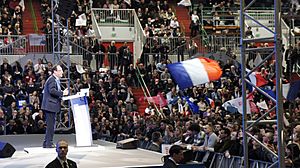
Hollande officially launched his campaign in January 2012. He focused on themes like equality and making sure financial systems were fair. He also shared a list of 60 policy ideas. These included creating more teaching jobs, changing the retirement age, and allowing same-sex couples to marry and adopt.
The first round of the presidential election was on 22 April 2012. Hollande came in first and then faced the current president, Nicolas Sarkozy, in a second round. On 6 May 2012, François Hollande was elected President of France with 51.6% of the vote.
President of France (2012–2017)
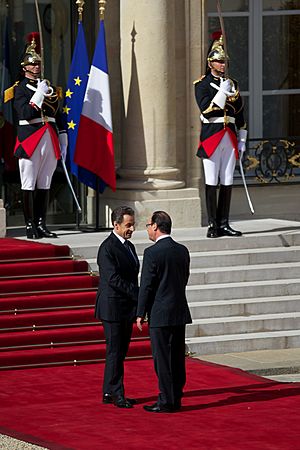
Hollande became president on 15 May 2012. He was the first Socialist Party president since François Mitterrand. Soon after, he chose Jean-Marc Ayrault to be his Prime Minister. His government was notable for having an equal number of men and women, which was a first for France. One of their first actions was to lower the salaries of the president and other government members.
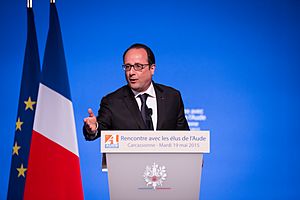
Economic Policies
Hollande's economic plans included several changes. He wanted to create a European credit rating agency and separate different types of banking activities. He also aimed to reduce the amount of electricity generated by nuclear power in France, favoring renewable energy.
He proposed changes to taxes, including higher taxes for very high incomes. He also wanted to create more jobs, especially in teaching, and help small and medium-sized businesses. His government also planned to build more public housing. He also changed the retirement age back to 60 for those who had worked for a long time.
Marriage and Adoption for Same-Sex Couples
Hollande strongly supported allowing same-sex couples to marry and adopt children. In July 2012, his Prime Minister confirmed that a law would be introduced.
The bill was presented in November 2012 and approved by the National Assembly in February 2013. After some changes and further votes, President Hollande signed the bill into law on 18 May 2013. The first same-sex weddings in France took place just eleven days later.
Labour Reform

As president, Hollande worked on changing labour laws to make France more competitive. These changes made it easier for workers to switch jobs and for companies to manage their employees. For example, companies could temporarily reduce workers' salaries or hours during tough economic times. This idea was inspired by Germany, where similar rules helped companies avoid large layoffs.
The new law also made it easier for companies and employees to resolve disagreements about layoffs. It also introduced training credits that stay with employees throughout their careers.
Pension Reform
Hollande also worked on reforming France's pension system. This was a difficult process, with many people, including unions, opposing the changes. There were large protests in Paris.
Despite the opposition, the French Parliament passed a reform in December 2013. The goal was to fix a predicted shortage in pension funds. Instead of raising the retirement age, the reform focused on increasing contributions to the pension system.
Foreign Affairs
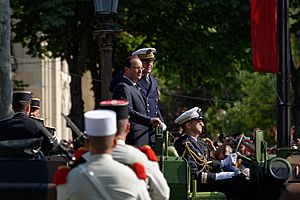
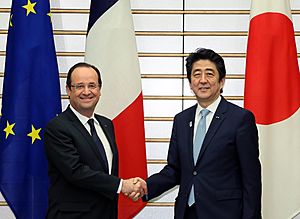
As president, Hollande promised to remove French combat troops from Afghanistan in 2012. He also wanted to strengthen the partnership between France and Germany. He suggested creating a joint research office and a common military headquarters for the two countries.
In January 2013, Hollande authorized a military operation in Mali to fight extremist groups. This action was popular in Mali, and Hollande promised to help rebuild the country. In 2014, some of these troops were moved to other parts of Africa to continue fighting militants.
In September 2015, Hollande spoke about the European migrant crisis. He warned countries that did not want to accept mandatory migrant quotas that they should think about their place in the European Union.
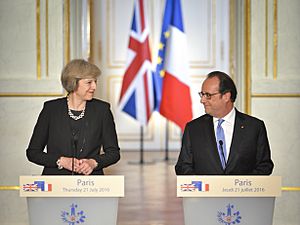
Approval Ratings
Hollande's popularity changed a lot during his presidency. In April 2014, his approval rating was quite low, at 18%. It reached a new low of 12% in November 2014. However, after the Charlie Hebdo attack in January 2015, his approval rating went up to 40%.
Despite this increase, his popularity generally declined over time. By April 2016, his approval rating was around 14%. Polls suggested he would not win if he ran for a second term in the 2017 presidential elections. In November 2016, his approval rating was only 4%. On 1 December 2016, he announced he would not seek re-election.
Post-presidential Life
After leaving office, François Hollande has continued to comment on French and international politics. He has written several books and given university lectures. In his books, he has shared his thoughts on the policies of his successor, Emmanuel Macron, and other political figures.
In November 2023, he took part in a march in Paris against antisemitism, following a rise in such incidents.
Return to National Assembly (2024)
On 15 June 2024, Hollande surprised many by announcing he would run for a seat in the National Assembly again. He ran in the first constituency of Corrèze.
He won his election in the second round, receiving 43% of the vote. This marked his return to the French parliament.
Personal Life
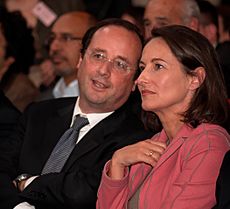
For 29 years, François Hollande's partner was Ségolène Royal, who is also a Socialist politician. They announced their separation in June 2007.
After their separation, Hollande began a relationship with French journalist Valérie Trierweiler. She confirmed their relationship in an interview in November 2007. When Hollande became president, Trierweiler moved into the Élysée Palace with him.
On 25 January 2014, Hollande announced his separation from Valérie Trierweiler. In September 2014, Trierweiler published a book about her time with Hollande.
On 4 June 2022, Hollande married actress Julie Gayet in Tulle, France.
Hollande was raised Catholic but later became an agnostic. He now considers himself an atheist but respects all religious practices.
Hollande is sometimes called "Flanby," which is a French dessert similar to flan. This nickname is used by his critics to suggest he is indecisive or soft.
Honours and Decorations
Hollande has received many honours both from France and from other countries around the world.
National Honours
| Ribbon bar | Honour | Date & Comment |
|---|---|---|
| Grand Cross of the National Order of the Legion of Honour | 15 May 2012 – automatically received when he became president | |
| Grand Cross of the National Order of Merit | 15 May 2012 – automatically received when he became president |
Foreign Honours
| Ribbon bar | Country | Honour | Date |
|---|---|---|---|
| Holy See | Proto-canon of the Papal Basilica of St. John Lateran | 15 May 2012 - 14 May 2017 | |
| Poland | Knight of the Order of the White Eagle | 16 November 2012 | |
| Italy | Knight Grand Cross with Collar of the Order of Merit of the Italian Republic | 21 November 2012 | |
| Senegal | Grand Cross of the National Order of the Lion | 27 November 2012 | |
| Brazil | Collar of the Order of the Southern Cross | 12 December 2012 | |
| UAE | Collar of the Order of Zayed | 15 January 2013 | |
| Morocco | Grand Collar of the Order of Muhammad | 3 April 2013 | |
| Panama | Grand Cross of the Order of Vasco Nunez de Balboa | 24 May 2013 | |
| Japan | Grand Cordon of the Order of the Chrysanthemum | 13 June 2013 | |
| Tunisia | Grand Cordon of the Order of the Republic of Tunisia | 4 July 2013 | |
| Finland | Grand Cross with Collar of the Order of the White Rose of Finland | 9 July 2013 | |
| Germany | Grand Cross Special Class of the Order of Merit of the Federal Republic of Germany | 3 September 2013 | |
| Palestine | Grand Collar of the State of Palestine | 13 September 2013 | |
| Mali | Grand Cordon of the National Order of Mali of Mali | 20 September 2013 | |
| Slovakia | Grand Cross of the Order of the White Double Cross | 29 October 2013 | |
| Austria | Grand Star of the Decoration of Honour for Services to the Republic of Austria | 5 November 2013 | |
| Monaco | Knight Grand Cross of the Order of Saint-Charles | 14 November 2013 | |
| KSA | Collar of the Order of Abdulaziz Al Saud | 30 December 2013 | |
| Netherlands | Knight Grand Cross of the Order of the Netherlands Lion | 20 January 2014 | |
| Belgium | Grand Cordon of the Order of Leopold | 3 February 2014 | |
| Mexico | Collar of the Order of the Aztec Eagle | 10 April 2014 | |
| United Kingdom | Honorary Knight Grand Cross of the Order of the Bath | 5 June 2014 | |
| Niger | Grand Cross of the National Order of Niger | 15 July 2014 | |
| Ivory Coast | Grand Cross of the National Order of the Ivory Coast | 17 July 2014 | |
| Armenia | Grand Cordon of the Order of Glory | 12 October 2014 | |
| Canada | Grand officier of the National Order of Quebec | 3 November 2014 | |
| Guinea | Grand Cross of the National Order of Merit | 26 November 2014 | |
| Sweden | Knight of the Royal Order of the Seraphim | 2 December 2014 | |
| Luxembourg | Knight of the Order of the Gold Lion of the House of Nassau | 6 March 2015 | |
| Spain | Knight of the Collar of the Order of Isabella the Catholic | 23 March 2015 | |
| Benin | Grand Cross of the National Order of Benin | 30 June 2015 | |
| Greece | Grand Cross of the Order of the Redeemer | 22 October 2015 | |
| Kazakhstan | Member 1st class of the Order of Friendship | 6 November 2015 | |
| Peru | Grand Cross of the Order of the Sun of Peru | 25 February 2016 | |
| Argentina | Grand Cross of the Order of the Liberator General San Martín | 25 February 2016 | |
| Central African Republic | Grand Cross of the Order of Central African recognition | 13 May 2016 | |
| Uruguay | Medal of the Oriental Republic of Uruguay | 30 May 2016 | |
| Portugal | Grand Collar of the Order of Liberty | 19 June 2016 | |
| Romania | Grand Collar of the Order of the Star of Romania | 13 September 2016 | |
| Colombia | Grand Cross of the Order of Boyaca | 25 January 2017 | |
| Ukraine | Member of the Order of Liberty | 1 October 2018 |
Key to the City
![]() Manila: Freedom of the City of Manila (26 February 2015).
Manila: Freedom of the City of Manila (26 February 2015).
Works
Hollande has written several books and academic works, including:
- L'Heure des choix. Pour une économie politique (The hour of choices. For a political economy), with Pierre Moscovici, 1991. ISBN: 2-7381-0146-1
- L'Idée socialiste aujourd'hui (The Socialist Idea Today), Omnibus, 2001. ISBN: 978-2-259-19584-3
- Devoirs de vérité (Duties of truth), interviews with Edwy Plenel, éd. Stock, 2007. ISBN: 978-2-234-05934-4
- Droit d'inventaires (Rights of inventory), interviews with Pierre Favier, Le Seuil, 2009. ISBN: 978-2-02-097913-9
- Le rêve français (The French Dream), Privat, August 2011. ISBN: 978-2-7089-4441-1
- Un destin pour la France (A Destiny for France), Fayard, January 2012. ISBN: 978-2-213-66283-1
- Changer de destin (Changing destiny), Robert Laffont, February 2012. ISBN: 978-2-221-13117-6
- Les leçons du pouvoir (The lessons of power), Stock, 2018. EAN 9782234084971
- Bouleversements: Pour comprendre la nouvelle donne mondiale, September, 2022. ISBN: 978-2-234-09399-7
- Affronter (clash), stock, October 2021. EAN 9782234087262
See also
 In Spanish: François Hollande para niños
In Spanish: François Hollande para niños
 | Georgia Louise Harris Brown |
 | Julian Abele |
 | Norma Merrick Sklarek |
 | William Sidney Pittman |


